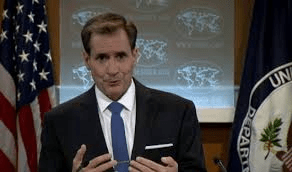On September 14, 2015, State Department Spokesperson John Kirby gave a daily press briefing in which he said: “The United States is deeply concerned by the recent violence and escalating tensions surrounding the Haram Al-Sharif/Temple Mount. We strongly condemn all acts of violence. It is absolutely critical that all sides exercise restraint, refrain from provocative actions and rhetoric, and preserve unchanged the historic status quo on the Haram Al-Sharif/Temple Mount in word and in practice.”
The comment came after a clash between Arab rock throwers and Israeli police on Rosh Hashanah, the Jewish New Year, as Arabs sought to prevent Jews from visiting the site.

State Department Spokesperson John Kirby
State Department Status Quo it Favors
The “status quo” that the State Department presumably sought to maintain was the ban on Jewish prayer on the entire 35 acre Temple Mount platform, the Jews’ holiest place on earth. That ban was put in place by Muslims in the middle of the 16th century, and Israel has allowed the Islamic Waqf to maintain the ban, even after it captured the Old City from Jordan and reunified the city in 1967.
State Department Status Quo it Seeks to Change
Later in this same briefing, Kirby responded to a question as to whether the Oslo Agreement between the Israelis and Palestinians should be scrapped since no Palestinian state was on the horizon: “Secretary Kerry is committed to pursuing a two-state solution, and I think you’re going to see him continue to do that throughout his tenure here at the department. I don’t think anybody’s – certainly not here – willing to give up on that ultimate goal.”
Kerry is “committed” to changing current reality and creating an Arab-led sovereign state in the holy land for the first time in history.
What makes one status quo worth keeping while the other is not? Does the State Department only endorse a status quo which Muslims desire (banning Jews from the Temple Mount) even though it is clearly anti-Semitic? Is it less a matter of favoring Muslim demands over American integrity and principle, but rather a function of seeking the support of 57 Arab countries versus a single Jewish State?
A more proper – and consistent – response would have been that Israel and the Jordanians and Palestinian Arabs will determine any changes to the status of Jerusalem and the holy sites as part of a final peace agreement. Those changes to the status quo will include matters of sovereignty and rights of access and prayer.
Related First One Through articles:
Joint Prayer: The Cave of the Patriarchs and the Temple Mount
The United Nations and Holy Sites in the Holy Land
Subscribe YouTube channel: FirstOneThrough
Join Facebook group: FirstOne Through Israel Analysis


Pingback: US State Department Comments on Terrorism in Israel and the Territories | FirstOneThrough
Pingback: Select Support in Fighting Terrorism from the US State Department | FirstOneThrough
Pingback: The US State Department Does Not Want Israel to Fight Terrorism | FirstOneThrough
Pingback: The Parameters of Palestinian Dignity | FirstOneThrough
Pingback: John Kerry: The Declaration and Observations of a Failure | FirstOneThrough
Pingback: Palestinian Jews and a Judenrein Palestine | FirstOneThrough
Pingback: Would You Rather Have Sovereignty or Control | FirstOneThrough
Pingback: Proposed Lame-Duck Actions for Israel | FirstOneThrough
Pingback: Will the UN Demand a Halt to Arabs Moving to Jerusalem? | FirstOneThrough
Pingback: On Defenses: Provocative and Legal / Unprovocative and Illegal | FirstOneThrough
Pingback: Biden Counts Votes, As He Pushes For Non-Orthodox Jews And Against Orthodox Jews In Jerusalem | FirstOneThrough
Pingback: The United States Is “Morally, Historically, and Politically Wrong” About The Jewish Temple Mount | FirstOneThrough
Pingback: The Big Lie About Al Aqsa Mosque Access Is Really About Jews | FirstOneThrough